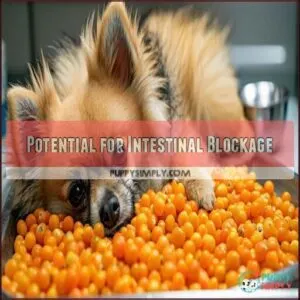This site is supported by our readers. We may earn a commission, at no cost to you, if you purchase through links.

The fruit itself is safe and even nutritious, offering vitamins, antioxidants, and fiber.
However, the seeds and skin are a no-go—they can cause stomach upset or even blockages. Always remove the seeds and peel the skin before sharing a small piece with your pup.
Keep portions in check, though, since too much fiber or sugar can lead to digestive trouble. Think of persimmons as an occasional treat, not a daily snack.
Curious about creative ways to serve this fruit safely? There’s more to explore on that front!
Table Of Contents
- Key Takeaways
- Nutritional Benefits
- Can Dogs Eat Persimmons
- Risks and Hazards
- Safe Serving Guidelines
- Preparation and Serving Methods
- Ensuring Dog Safety
- Frequently Asked Questions (FAQs)
- What happens if a dog eats a persimmon?
- Are persimmons good for You?
- Can dogs eat persimmon without seeds?
- Can dogs eat Fuyu persimmons?
- Are persimmons good for dogs?
- Are unripe persimmons poisonous to dogs?
- Can dogs eat yellow persimmons?
- Can dogs eat mashed persimmons?
- What happens if my dog eats persimmon?
- Are any fruits toxic to dogs?
- Conclusion
Key Takeaways
- Remove the seeds and skin before giving persimmons to your dog to avoid choking hazards and digestive blockages.
- Serve persimmons in small portions to prevent tummy troubles from too much fiber or sugar.
- Fully ripe persimmons are safer and easier on your dog’s stomach than unripe ones.
- Always monitor your dog for any signs of discomfort or allergies after introducing persimmons.
Nutritional Benefits
You might be surprised to learn that persimmons pack a nutritional punch for your furry friend, offering a range of health-boosting vitamins and minerals.
From antioxidants that support immune health to fiber that aids digestion, these vibrant fruits can be a tasty and beneficial occasional treat for your canine companion.
Rich in Antioxidants and Vitamins
Right off the bat, persimmons are a powerhouse of vitamins that can give your furry friend’s health a serious boost.
Packed with Vitamin A, lycopene, and beta-carotene, these fruits deliver antioxidants that support your dog’s immune system.
A burst of Vitamin A and lycopene, persimmons supercharge your dog’s immune system with antioxidant power for vibrant health.
They’ll help neutralize harmful free radicals, promoting overall wellness and potentially reducing the risk of chronic diseases.
High in Fiber and Manganese
Though fiber and manganese might sound like technical nutrition terms, they’re significant for your furry friend’s health.
Persimmons pack a powerful punch with these nutrients:
- Supports smooth digestive processes
- Promotes strong bone development
- Enhances energy metabolism
- Regulates bodily functions
Fiber helps maintain your dog’s gut balance, while manganese works behind the scenes to keep their body running like a well-oiled machine.
These nutrients are your pup’s dietary superheroes.
It’s worth noting that supplement effectiveness varies across different products.
Natural Energy Source
After exploring fiber’s benefits, let’s talk energy!
Persimmons pack a natural punch for your pup’s activity levels.
These sweet fruits offer sustained energy release through natural sugars and vitamin C.
However, moderation is key—small portions prevent sugar overload while providing a healthy dog nutrition boost.
Think of persimmons as an occasional energy-packed treat that keeps tails wagging.
Anti-inflammatory and Anti-cancer Properties
Beyond energy, persimmon benefits dogs with its powerful antioxidants like carotenoids and flavonoids, offering inflammation reduction and cancer prevention.
These antiinflammatory compounds support cellular protection and immune boosts, keeping your pup healthier.
Lycopene, found in the skin, adds anticancer properties, while proanthocyanidins fight harmful free radicals.
It’s a small fruit with big health benefits for your furry friend!
Can Dogs Eat Persimmons
Yes, dogs can eat persimmons, but it’s not as simple as handing over the whole fruit.
The type of persimmon variety and ripeness matters when deciding if this dog-friendly fruit is safe.
Fully ripe persimmons are softer and easier on your dog’s stomach, while unripe ones might cause digestive upset.
Portion control is key—too much can lead to tummy troubles.
Small breeds are more sensitive to overindulgence, so adjust servings based on your dog’s size.
While persimmons for dogs can be a tasty treat, some pups may prefer alternative fruits like apples or blueberries.
Always introduce new foods gradually and watch for any signs of discomfort.
Like plums, persimmon pits can also present a choking hazard, and cyanide content is toxic.
So, are persimmons safe?
Yes, but only when served thoughtfully and in moderation.
Risks and Hazards
Feeding persimmons to your dog might seem harmless, but it comes with some risks you shouldn’t ignore.
From choking hazards to upset stomachs, understanding these dangers can help you keep your furry friend safe.
Seeds and Skin May Cause Stomach Obstructions
Persimmon seeds and skin can spell trouble for dogs.
Their indigestible fibers may lead to gastrointestinal obstructions, including phytobezoar formation. Tannins in the skin can harden in the stomach, causing blockage. Smaller breeds face higher risks, sometimes requiring surgical removal.
Watch for these dangers:
- Vomiting or abdominal pain
- Lethargy or appetite loss
- Persistent constipation
- Signs of blockage
- Breed susceptibility concerns
Potential for Intestinal Blockage
Persimmon seeds in dogs can lead to intestinal blockage, especially in smaller breeds.
These seeds may cause inflammation or form phytobezoars, requiring surgical intervention.
Watch for blockage symptoms like vomiting, lethargy, or loss of appetite.
Always prioritize seed removal before feeding persimmon pulp to dogs.
Breed susceptibility varies, so consult your vet if unsure.
| Risk | Details |
|---|---|
| Seeds | Can block intestines |
| Phytobezoar Formation | Hardened masses in the gut |
| Symptoms | Vomiting, lethargy, abdominal pain |
| Smaller Breeds | Higher risk of blockage |
| Intervention | Surgery may be needed |
High Fiber Content and Digestive Issues
While seeds can block a dog’s stomach, too much fiber in persimmons for dogs might upset the digestive system.
Fiber overload can lead to loose bowel movements or even disrupt the gut microbiome.
Persimmons act like natural laxatives, which sounds helpful but might cause more harm than good.
Stick to moderation to keep digestion regulation smooth and avoid digestive issues.
Excessive Sugar Intake and Allergies
Too much fiber isn’t the only concern—persimmons pack a sugary punch! Excessive sugar intake can lead to weight management issues, diabetes risks, and upset gut health.
Plus, dog allergies are rare but possible. Watch for:
- Allergic reactions like itching or swelling.
- Weight gain from sugar overload.
- Veterinarian advice if symptoms appear.
Keep persimmons an occasional treat!
Dog owners should also be aware that supplement use is common in pets, so always consult with a vet about potential interactions.
Safe Serving Guidelines
If you’re thinking about sharing persimmons with your dog, it’s important to prepare them the right way.
Simple steps like removing seeds, washing the fruit, and cutting it into small pieces can make all the difference for their safety.
Removing Seeds and Pits
To keep your pup safe, always remove persimmon seeds and pits before serving.
These can be a choking hazard or cause blockages, especially in smaller breeds.
Use seed removal tools or safe cutting techniques for easy pit extraction.
Preventing accidental ingestion is key—seeds and pits aren’t toxic, but they’re trouble!
Consider using a specialized persimmon tool to streamline the process.
Stick to smooth persimmon pulp for dogs to enjoy safely.
Washing and Cutting The Fruit
Before feeding persimmons to dogs, always wash thoroughly to remove dirt and pesticides. Cut off the stem and any leaves, as they’re not digestible. Slice the fruit into bite-size pieces to prevent choking hazards. Consider using specialized cutting tools for this task.
- Wash thoroughly under cool water.
- Remove stems and leaves completely.
- Cut into bite-size pieces for safe chewing.
This guarantees your pup enjoys persimmon pulp safely!
Mashing for Easier Digestion
If your dog struggles with chewing or digestion, mashing persimmons can help.
Turning the fruit into a soft pulp makes it easier on their digestive system, especially for puppies or senior dogs.
Persimmon mash also blends well with other foods. Stick to small portion sizes, as too much can upset their stomach.
Mashing benefits digestion and keeps treats safe.
Mixing With Regular Dog Food
Adding persimmons to your dog’s regular food can boost food palatability while supporting dietary balance.
Slice or mash the fruit, then mix small portions into their meal.
This approach guarantees portion control and avoids overwhelming their dog diet.
It’s a tasty way to enhance canine nutrition, but watch for food allergies when introducing new fruit for dogs like persimmons.
Consider using nutritious food enhancements to further improve your dog’s diet. Slice or mash the fruit.
Creative Serving Options
After mixing persimmons with regular food, why not get creative?
Try Frozen Persimmons as a cool snack or whip up a Persimmon Puree for easy digestion.
Persimmon Ice Cream or a dog smoothie can be fun, healthy treats on hot days.
Add Persimmon Toppings to meals, or bake dog treats using simple dog treats recipes.
Keep it safe and tasty!
Preparation and Serving Methods
You’ll want to prepare persimmons carefully to keep your dog safe and healthy.
From drying to baking, there are plenty of simple ways to serve this fruit as a tasty treat.
Dried Persimmons
Dried persimmons can be a tasty treat, but you’ve got to be cautious. Their concentrated sugar content might upset your dog’s stomach.
Stick to safe quantities and use these tips:
- Choose freeze-dried or air-dried options without additives.
- Avoid tough pieces that cause chewing difficulty.
- Always remove seeds before drying.
- Try homemade recipes for better control.
To confirm safety and quality, consider freeze-drying entire meals at home.
Cooked Persimmons
Cooking methods like steaming or boiling can make persimmons easier for dogs to digest while retaining nutrients.
Cooked persimmons are softer, boosting palatability and aiding dog digestion.
Always remove seeds and pits first—they’re a no-go for dog health.
A simple recipe idea? Mash cooked persimmons and mix with plain oatmeal for a treat.
Moderation guarantees nutrient retention without overloading your pup!
Persimmon Smoothies
If cooked persimmons aren’t your dog’s style, try a revitalizing persimmon smoothie!
This dog-friendly fruit blends well with yogurt and water for a simple treat.
Follow these tips:
- Use dog-safe ingredients like plain yogurt—no sugar or artificial sweeteners.
- Stick to small serving sizes to avoid tummy trouble.
- Store leftovers in the fridge for up to two days.
Baked Persimmon Treats
Baked persimmon treats are a fun way to spoil your pup!
Mash ripe persimmons, mix with rolled oats and peanut butter, then bake.
Use these quick tips:
| Recipe Variations | Baking Temperatures | Storage Options |
|---|---|---|
| Add pumpkin puree | Bake at 350°F | Store in airtight jars |
| Substitute bananas | Use parchment paper | Refrigerate leftovers |
| Mix with carrots | Bake for 20 minutes | Freeze for freshness |
Always remove seeds and pits!
Ensuring Dog Safety
Keeping your dog safe while introducing new foods like persimmons is key. You’ll need to watch for any unusual symptoms and consult your vet if you’re unsure.
Monitoring for Signs of Illness
After serving persimmons, keep an eye on your dog.
Observe behavior for lethargy indicators or vomiting signs. Check stool for diarrhea or unusual changes.
A sudden loss of appetite might signal persimmon risks dogs face, like intestinal blockage.
If your dog seems off, don’t ignore it—small issues can escalate quickly.
Monitoring guarantees dogs eat persimmons safely without complications.
Consulting a Veterinarian for Advice
If you’re unsure about persimmon risks for dogs, consulting a veterinarian is smart.
They can address specific concerns like breed predisposition or health history.
Ask about:
- Dietary integration: How much persimmon is safe?
- Dosage guidance: What’s ideal for your dog’s size?
- Dog digestive system: Is persimmon suitable for their gut?
Always prioritize professional medical advice!
Precautions for Dogs With Health Conditions
If your dog has existing conditions like diabetes or sensitive stomachs, be cautious with persimmons.
High sugar can disrupt weight management, and persimmon seeds can worsen gastrointestinal disturbances.
Always check for medication interactions or dietary restrictions before letting dogs eat persimmons.
Consult your vet for personalized advice, especially if your pup’s health needs extra care.
Safety first!
Staying Updated on Veterinary Research
Keeping up with research advancements guarantees your dog stays healthy and safe.
Follow veterinary blogs, subscribe to newsletters, and explore emerging treatments or diagnostic improvements.
Learn about breed predispositions and preventative strategies to tailor pet nutrition and dietary recommendations.
Your veterinarian is a goldmine for dog dietary advice—don’t hesitate to ask about the latest in pet health science!
Frequently Asked Questions (FAQs)
What happens if a dog eats a persimmon?
Imagine handing your dog a treasure chest, but inside are hidden risks.
If they eat a persimmon, it’s mostly safe—just avoid seeds and pits, as they can cause blockages or digestive issues.
Moderation’s key!
Are persimmons good for You?
Persimmons are packed with vitamins A, C, and B, plus antioxidants and fiber, making them a nutritious snack.
They support vision, immunity, and digestion, but moderation’s key due to their natural sugars and potential digestive effects.
Can dogs eat persimmon without seeds?
Yes, dogs can eat persimmons without seeds.
Just make sure to remove the seeds and pits first, as they can cause blockages.
Serve small, bite-sized pieces as an occasional treat to avoid digestive issues.
Can dogs eat Fuyu persimmons?
Fuyu persimmons are safe for dogs in moderation, but always remove the seeds and pits first.
Slice the fruit into bite-sized pieces to prevent choking, and introduce it gradually to avoid upsetting your pup’s stomach.
Are persimmons good for dogs?
They’re packed with vitamins, fiber, and antioxidants, supporting your dog’s digestion, immune system, and overall health.
Just remember to remove seeds and pits, serve in moderation, and watch for any allergic reactions or tummy troubles.
Are unripe persimmons poisonous to dogs?
Unripe persimmons aren’t poisonous, but they can upset your dog’s stomach due to high tannin levels.
These can cause digestive issues or even blockages, especially in smaller dogs, so it’s best to avoid them.
Can dogs eat yellow persimmons?
Dogs can eat yellow persimmons in moderation, but always remove the seeds and pits first.
Chop the fruit into bite-sized pieces to avoid choking, and introduce it gradually to prevent digestive issues.
Monitor for reactions!
Can dogs eat mashed persimmons?
Imagine a juicy, vibrant orange treat mashed into a smooth, creamy texture—yes, dogs can enjoy mashed persimmons!
Just remove seeds and skin first, serve in moderation, and watch for any tummy troubles afterward.
What happens if my dog eats persimmon?
If your dog eats persimmon, watch for signs like vomiting, diarrhea, or abdominal pain, especially if seeds were ingested.
Remove seeds beforehand, and call your vet if you notice choking, lethargy, or persistent symptoms.
Are any fruits toxic to dogs?
Over 700 plants can harm dogs, including fruits like grapes, raisins, cherries, and avocados.
These can cause serious issues like kidney failure or toxicity.
Always double-check before sharing, so your pup stays safe and healthy!
Conclusion
Just like fruit in a balanced diet for humans, persimmons can be a nice treat for dogs—if done right.
Always peel the skin, remove the seeds, and serve in small portions to avoid any risks.
Though persimmons are packed with nutrients, too much can lead to upset tummies or worse.
When asking, “Can dogs eat persimmons?”, the answer is yes, but moderation is key.
If in doubt, check with your vet to keep your furry friend safe.
- https://veterinaryemergencygroup.com/blog/allergic-reaction-in-dogs/
- https://vcahospitals.com/know-your-pet/antioxidants
- https://www.pdsa.org.uk/pet-help-and-advice/looking-after-your-pet/puppies-dogs/safe-fruit-and-veg-for-dogs
- https://privacy.masterclass.com/
- https://pangovet.com/?utm_source=dogster&utm_medium=article&utm_campaign=dog-nutrition/

















